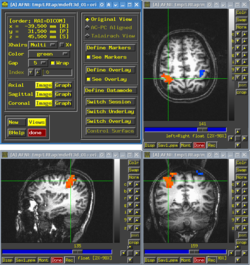
Cognitive rehabilitation therapy
Encyclopedia

Cognitive rehabilitation therapy has been shown to be effective for individuals who suffered a stroke in the left or right hemisphere. A computer-assisted type of cognitive rehabilitation therapy called Cognitive Remediation Therapy
Cognitive Remediation Therapy
Cognitive Remediation Therapy is a cognitive rehabilitation therapy developed at King's College in London designed to improve neurocognitive abilities such as attention, working memory, cognitive flexibility and planning, and executive functioning which leads to improved social functioning.CRT...
has been used to treat schizophrenia
Schizophrenia
Schizophrenia is a mental disorder characterized by a disintegration of thought processes and of emotional responsiveness. It most commonly manifests itself as auditory hallucinations, paranoid or bizarre delusions, or disorganized speech and thinking, and it is accompanied by significant social...
, ADHD, and Major depressive disorder.
It may also be recommended for traumatic brain injury
Traumatic brain injury
Traumatic brain injury , also known as intracranial injury, occurs when an external force traumatically injures the brain. TBI can be classified based on severity, mechanism , or other features...
, such as that suffered by U.S. Representative Gabrielle Giffords
Gabrielle Giffords
Gabrielle Dee "Gabby" Giffords is an American politician. A Democratic member of the United States House of Representatives, she has represented since 2007. She is the third woman in Arizona's history to be elected to the U.S. Congress...
, according to Dr. Gregory J. O'Shanick of the Brain Injury Association of America. Her new doctor has confirmed that it will be part of her rehabilitation.
Assessments of cognitive rehabilitation therapy
According to the standard text by Sohlberg and Mateer:Individuals and families respond differently to different interventions, in different ways, at different times after injury. Premorbid functioning, personality, social support, and environmental demands are but a few of the factors that can profoundly influence outcome. In this variable response to treatment, cognitive rehabilitation is no different from treatment for cancer, diabetes, heart disease, Parkinson's disease, spinal cord injury, psychiatric disorders, or any other injury or disease process for which variable response to different treatments is the norm.
Nevertheless, many different statistical analyses of the benefits of this therapy have been carried out. One study made in 2002 analyzed 47 treatment comparisons and reported "a differential benefit in favor of cognitive rehabilitation in 37 of 47 (78.7%) comparisons, with no comparison demonstrating a benefit in favor of the alternative treatment condition."
An internal study conducted by the Tricare Management Agency in 2009 is cited by the US Department of Defense as its reason for refusing to pay for this therapy for veterans who have suffered traumatic brain injury. According to Tricare, "There is insufficient, evidence-based research available to conclude that cognitive rehabilitation therapy is beneficial in treating traumatic brain injury." The ECRI Institute, whose report serves as the basis for this decision by the Department of Defense, has summed up their own findings this way:
In our report, we carried out several meta-analyses using data from 18 randomized controlled trials. Based on data from these studies, we were able to conclude the following:
- Adults with moderate to severe traumatic brain injury who receive social skills training perform significantly better on measures of social communication than patients who receive no treatment.
- Adults with traumatic brain injury who receive comprehensive cognitive rehabilitation therapy report significant improvement on measures of quality of life compared to patients who receive a less intense form of therapy.
The strength of the evidence supporting our conclusions was low due to the small number of studies that addressed the outcomes of interest. Further, the evidence was too weak to draw any definitive conclusions about the effectiveness of cognitive rehabilitation therapy for treating deficits related to the following cognitive areas: attention, memory, visuospacial skills, and executive function. The following factors contributed to the weakness of the evidence: differences in the outcomes assessed in the studies, differences in the types of cognitive rehabilitation therapy methods/strategies employed across studies, differences in the control conditions, and/or insufficient number of studies addressing an outcome.
Citing this 2009 assessment, US Department of Defense has declared that cognitive rehabilitation therapy is scientifically unproved. As a result, it refuses to cover the cost of cognitive rehabilition for brain-injured veterans.

